Jejemon
Part of a series on Internet Slang. [View Related Entries]
About
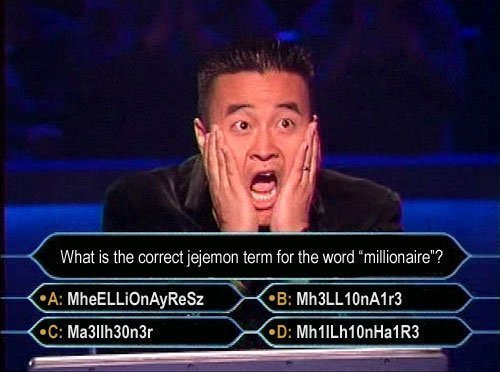
In the Philippines, Jejemon is an internet slang used to describe someone who "typEs LyK tHIs." Similar to l33tspeak on the English-speaking web, Jejenese (the language of Jejemons) can be defined as "subversion of the English language to the point of incomprehensibility," according to Urban Dictionary. In addition to its own language, the phenomenon has developed into a subculture.
Origin
According to various blogs, the possible originator of the Jejemon phenomenon is a person that goes by the alias "LiL' ZupLadO". The name "Jejemon" likely originates from the users' tendencies to type "jejeje," the Spanish equivalent of "hehehe," and "-mon," a shorthand for "monster" popularized by the Pokemon franchise.
Such practice of intentional misspelling has its earlier roots in "txt talk" (SMS) due to its short character-length capacity (160 characters per message). Its online breakthrough started on April 14, 2010 at Pinoy Tumblr.
There was a post with Filipino vice presidential candidate, Jejomar Binay. With a fake poster calling him Jejemon Binay. Later, the use of the word Jejemon would be used to describe those who talked like that.

Spread
These kinds of people have been seen around social networking sites. Such as Friendster, Facebook, Tumblr and Myspace. They are not only limited to Filipinos, but to Thais as well. Using "55555" to show "hahahahaha" because 5 in Thai language, translates to "ha". Notable quotes from the spread of Jejemons would be:
"CAUTION: THESE INDIVIDUALS ARE BREEDING! THEY CAN BE SEEN WRECKING GRAMMATICAL HAVOC ON FACEBOOK TOO!" "2) Jejemons are not just confined to trying-hard Filipino gangsters and emos. A Jejemon can also include a variety of Latino-Hispanic fags who enjoy typing "jejejejeje" in a wider context, much to the disdain of their opponents in an internet MMORPG game such as Ragnarok and DOTA."
Currently, there are multiple groups in facebook (currently more than 300 group results for "jejemon") to support and to oppose the jejemons. Although most of them are in Tagalog, though some are in english.
There is also an official translator entirely dedicated to the phenomenon.
Levels of Jejemon
There are 4 notable levels of being a jejemon. Mild, moderate, severe and terminal jejenism. Here are examples of what each would look like.
- Mild: eow~ p0Wh HOw zaRezu – How are you?
- Moderate: EOW p0wh~ hoW~ zAreZu~ iTZ beEN A loNG tym~ SincE weVE SeEn eAcH othEr~ – hello how are you it's been a long time since we've seen each other
- Severe: GUDpM~ p0Wh. hoW ZaREZu~ 2nYT, n0H? itz alReADY 3 m nd u zAREzstLl aWKe JEJEJe p0wh.~ U sHoUld SleEp~ alrEADY~ BeCauSe iT iz l8~ jeJejeJEje~ – Good evening. How are you tonight? It's already 3am and you are still awake. You should sleep already because it is late.
- Terminal: EOW P0WH THeRe~ P0wh. NicE MEEtNg u~ JEjEjeje~ p0Wh. WTZ Ur nME, N0H?~ H0W ZarezU 2dAy JeJeje DO U THnk~ thAt~ we~ ShOuld~ Go sOMEwER, n0H?~ ur GoiNg 2 go aLREaDY,~ n0H? nicE~ mEETnG~ u JejejEjEJEJejE – Hello there. Nice meeting you. What is your name? How are you today? Do you think that we should go somewhere? Your going already? Nice meeting you.
Common Characteristics
On April 26, 2010 YouTube user crazysynch posted the following video to help describe how to spot a jejemon and how to translate their spelling.
Reaction
Not surprisingly, Jejemon phenomenon has been met by negative response from those not so fond of it at all, so much that jejebusters have emerged on the scene to stop the jejetyping and the jejemons. Most of the people who make up the jejebusters can be seen as Grammar Nazis, who will try to humiliate jejemons to the dead end of conversation.
On April 28th, 2010 a segment about jejemons appeared on Saksi, the late night news broadcast of the GMA network</a,> in the Philippines.
Jejemon vs. Leet
According to Wikipedia, Jejenese as a social dialect is derived from English, Filipino, and "Taglish," a combination of English and Tagalog. Like Leet, Jejenese uses numeric characters in place of letters and letter rearrangement within a word. Two more defining characteristics of Jejenese is alternating capitalization and overusing letters, especially H, X, and Z. While they are similar, those two characteristics clearly define Jejenese as separate from Leet.

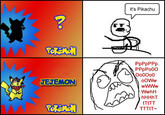

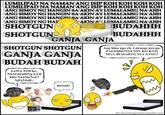
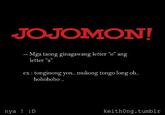
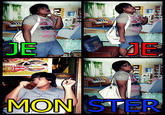

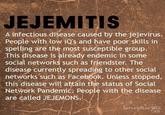
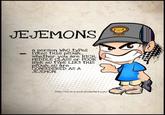
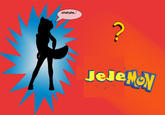
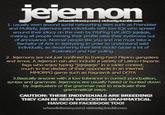
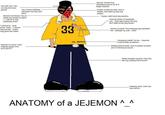

Top Comments
HorribleGhost
Feb 27, 2013 at 12:39AM EST
Dick Crosby - ウエイバーコホーム
Aug 06, 2016 at 02:56PM EDT